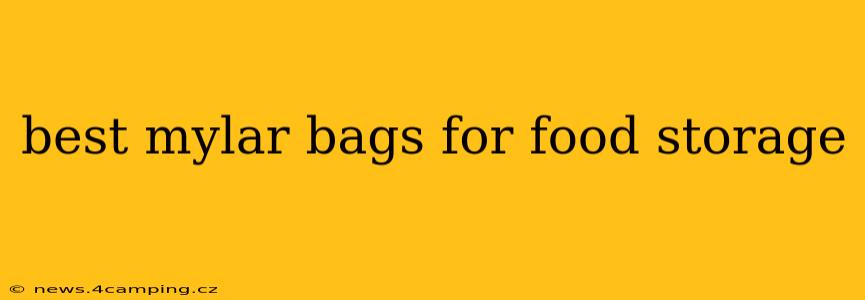Mylar bags have become increasingly popular for long-term food storage due to their exceptional ability to protect against moisture, oxygen, and light. This comprehensive guide will help you navigate the world of mylar bags and choose the best option for your needs. We'll explore different features, sizes, and considerations to ensure you're making an informed decision.
What Makes Mylar Bags Ideal for Food Storage?
Mylar bags, technically made from a polyester film with a metalized layer, offer superior protection compared to other storage methods. Their key advantages include:
- Oxygen Barrier: Mylar's low permeability to oxygen prevents oxidation, a major cause of food spoilage and rancidity. This is crucial for preserving the quality and nutritional value of your stored food.
- Moisture Barrier: Mylar's robust barrier against moisture protects against dampness and condensation, preventing mold growth and extending shelf life significantly.
- Light Protection: The metalized layer blocks UV light, which can degrade certain vitamins and alter the taste and appearance of your food.
- Durability: Mylar bags are tear-resistant and durable, providing reliable protection against punctures and damage during storage.
Types of Mylar Bags for Food Storage
Several factors differentiate mylar bags, impacting their suitability for specific needs:
- Size and Capacity: Bags range from small, individual portions to large bags ideal for storing bulk grains or other items. Consider the quantity of food you need to store when making your selection.
- Thickness (Mil): The thickness, measured in mils (thousandths of an inch), dictates the bag's strength and barrier protection. Thicker bags offer superior protection but are generally more expensive. 7 mil or thicker is usually recommended for long-term storage.
- Sealing Method: Bags may require heat sealing with a specialized sealer or may feature a zip-lock closure for easier sealing and repeated access. Heat-sealed bags offer superior protection against air intrusion.
- Material Composition: While the core material is generally mylar, some bags may incorporate other layers, such as polyethylene, to improve strength or flexibility.
Choosing the Right Mylar Bags: Key Considerations
Selecting the best mylar bag for your food storage needs involves careful consideration of the following:
- Food Type: Different foods have varying storage requirements. Delicate foods may necessitate thicker bags or more advanced sealing techniques.
- Storage Duration: Long-term storage necessitates higher quality, thicker mylar bags with a reliable seal to prevent degradation.
- Budget: Mylar bags come in a range of prices. Weigh the cost against the level of protection and convenience offered.
H2: What are the different sizes of mylar bags available?
Mylar bags are available in a wide range of sizes, from small pouches perfect for individual servings of snacks or spices to large bags capable of holding several gallons of grains or beans. The best size will depend on your specific needs and storage capacity. You'll find options measured in inches or even gallons, depending on the supplier. Consider the volume of food you wish to store before purchasing.
H2: How do I properly seal mylar bags for food storage?
Proper sealing is critical to preserving food in mylar bags. Heat sealing is the most effective method, creating an airtight barrier that protects against oxygen and moisture. A dedicated heat sealer is recommended for best results. For bags with zip-lock closures, ensure the zip seal is completely closed and possibly add oxygen absorbers to further enhance preservation.
H2: How long will food last in mylar bags?
The shelf life of food stored in mylar bags significantly depends on the type of food, the quality of the bag, the proper sealing method, and the storage conditions. Under ideal conditions (cool, dark, and dry environment), many foods can maintain their quality for several years or even longer. However, it is always recommended to rotate your food supply regularly and inspect packages for any signs of damage or spoilage.
H2: Are Mylar Bags Safe for Food Storage?
Yes, mylar bags are generally considered safe for food storage when sourced from reputable suppliers. Ensure that the bags are explicitly labeled as food-grade and free of harmful chemicals. Always inspect the bags for any damage before using them.
Conclusion: Finding Your Perfect Mylar Bags
Choosing the right mylar bags is crucial for successful long-term food storage. By carefully considering the factors outlined above – size, thickness, sealing method, and food type – you can select the best bags to preserve your food's quality and nutritional value for years to come. Remember to prioritize quality, proper sealing techniques, and ideal storage conditions for optimal results.
